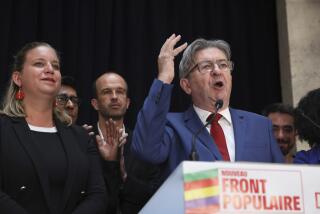France President Francois Hollande may gain more power in vote
- Share via
PARIS — He calls himself Mr. Normal. But that’s only if “normal” means having the chance to become one of France’s strongest presidents in recent memory.
Francois Hollande, the unassuming politician who won last month’s presidential election, is on the verge of cementing that victory by securing a legislative majority. If his Socialists can achieve that feat at the polls Sunday, or at least join up afterward with allies from like-minded parties, Hollande would occupy a commanding position that France’s left hasn’t enjoyed in a generation.
At stake is not just ascendancy at home, as much as the Socialists relish the prospect. A parliamentary triumph could resonate throughout the European Union, boosting Hollande’s profile as leader of the charge to turn Europe away from its fixation on austerity toward promoting growth as the key to solving its economic crisis.
“Reaching a majority in the assembly would clearly give Hollande more legitimacy to carry out a more radical policy both at home and at the EU level,” Oxford scholar Sophie Heine said. “The political and symbolic weight of France in the EU is still very substantial.”
Since moving into the presidential palace May 15, Hollande has already taken a small step or two on the domestic front, including bringing the retirement age for some workers back down to 60.
Bigger battles lie ahead. France is grappling with a 10% unemployment rate, a flat-lining economy and a budget deficit that even the anti-austerity Hollande has promised to shrink, though he has remained deliberately vague on how during the parliamentary campaign.
Nonetheless, many French appear to have embraced his message. A survey last week showed that 53% of people feel more confident about their country’s economic future, a 20-percentage-point jump from just before Hollande became president.
Although the Socialists could eke out a majority in the 577-seat National Assembly in voting Sunday and runoff elections a week later, many analysts expect the party to fall slightly short. In that case, it would have to work with the Green Party and the more radical Left Front.
That could complicate Hollande’s life somewhat. But with control of the Assembly, the Senate and many of France’s local authorities, the left would have more levers of power at its disposal than at any time since Francois Mitterrand was elected president in 1981.
“We need the PS [Socialist Party] to have a large majority in the Assembly so they can really get to work putting France back on its feet,” said Emilie, a Hollande supporter who declined to give her full name. “I am not worried about the PS having too much power…. The left in France is much more diverse, some would say divided, than the right, so there’s a greater diversity of ideas and opinions.”
By contrast, the center-right Union for a Popular Movement has been struggling mightily since Hollande defeated incumbent President Nicolas Sarkozy, the diminutive politician whose outsized personality had managed to keep the party together.
Its troubles have benefited the far-right, anti-immigrant National Front, whose leader, Marine Le Pen, scored a stunning 18% of the vote in the first round of the presidential election. Although the National Front can hope for only a small number of seats in the Assembly because of the way the French electoral system works, even that result would represent huge progress for it.
Victory for Hollande in the legislative races would strengthen his hand in Brussels as the EU continues to confront the debt and financial crisis that’s threatening the survival of its biggest project, the shared euro currency.
Until last month, German Chancellor Angela Merkel dictated the response to the euro crisis, supported by a relatively quiescent Sarkozy. Hollande has cast himself as a less pliable partner.
“What makes him powerful on the European level is that somehow he represents a shift in the terms of the debate, a movement against austerity politics,” said Christopher Bickerton, a political scientist at the Paris School of International Affairs at Sciences Po university. “He’s at the right place at the right time, which is to say that his stuff on growth coincided with what was a discernible shift in European sentiment.”
Whether Hollande can succeed in making more than modest changes to the euro crisis battle plan remains to be seen.
Although Hollande favors greater spending to stimulate European economies, Merkel is unlikely to bend much in that direction. And Hollande’s pledge to rewrite a German-backed EU treaty on fiscal restraint might have to be scrapped in favor of simply tacking on an addendum about promoting growth.
But Berlin will have no choice but to pay Paris some heed.
“France is not as ascendant as Germany in economic terms, but in terms of the power in the EU as a whole, France is an inescapable part of any solution,” Bickerton said. “It’s very difficult to imagine any sort of solution that’s explicitly rejected by the French government.”
News assistant Janet Stobart in the London bureau and special correspondent Kim Willsher in Paris contributed to this report.
More to Read
Sign up for Essential California
The most important California stories and recommendations in your inbox every morning.
You may occasionally receive promotional content from the Los Angeles Times.











